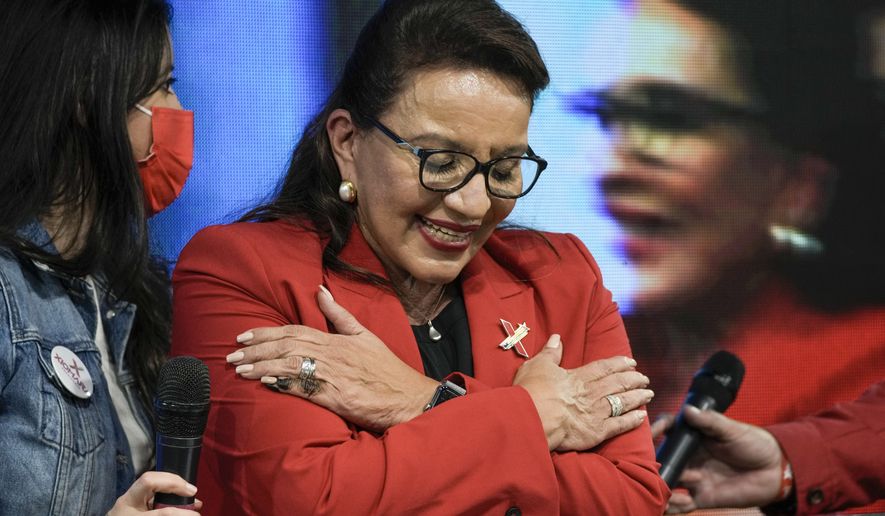The apparent victory of leftist challenger Xiomara Castro in Sunday’s presidential election in Honduras is being warmly welcomed in another capital — Beijing.
Honduras is one of just 15 countries that recognize Taiwan as the official government of China, and Ms. Castro said during the campaign she would move to end the relationship with the island democracy that China insists is part of its sovereign territory.
The latest tallies Monday gave Ms. Castro a commanding 51% to 33% lead over ruling National Party candidate and Tegucigalpa Mayor Nasry Asfura. Turnout was strong and international observers praised the generally peaceful and orderly vote.
The Taiwan-China question was not a central part of Ms. Castro’s campaign, which focused heavily on the corruption and the troubles of outgoing President Juan Orlando Hernandez, who has faced charges from U.S. prosecutors of extensive ties to drug traffickers during his four years in office. Ms. Castro, whose husband served as president before being ousted by a military coup in 2009, promised to begin a national dialogue immediately with all sectors of society to address the Central American nation’s problems, which include corruption, high rates of poverty, gang violence in the streets and natural disasters that have ravaged the countryside.
“Today the people have obtained justice,” she told a cheering crowd of the Libre Party supporters as the votes came in Sunday. “We have reversed authoritarianism.”
If she carries through on her China promise, Honduras would join other Central American countries in shifting recognition to Beijing in recent years, including Costa Rica, El Salvador, Panama and the Dominican Republic.
The shift also would be a blow to the Biden administration, which made it clear in a recent visit by Assistant Secretary of State Brian Nichols that Washington is uneasy with inroads made by China in the region and would very much like the Honduran government to stick with Taiwan.
“We’ve been quite clear with all the key actors in Honduras why we think the Honduras-Taiwan relationship is so important,” a State Department official told reporters in a background telephone briefing just last week, according to the Reuters news agency. “ … We’ve said that to both of the leading candidates directly.”
Chinese Foreign Ministry spokesman Wang Wenbin declined Monday at a briefing to address the Honduran results directly, telling reporters only that “we are ready to grow friendly and cooperative relations with all countries on the basis of upholding the one-China principle.”
But China’s state-controlled nationalist press was far less restrained, hailing the result a major setback for Taiwan and the United States.
The Global Times news website called Ms. Castro’s victory a “heavy blow” to Taiwanese “secessionists.”
The website ran an opinion piece Monday by Pan Deng, executive director of the Latin American and Caribbean Region Law Center of China University of Political Science and Law, predicting other countries in the region that recognize Taiwan — including Nicaragua, Haiti and Guatemala — may soon follow suit and shift to Beijing in light of Sunday’s result.
“For those countries which are serving as U.S. pawns in provoking China over the Taiwan question, they should make a serious reflection over which side of history they should take and learn something from Honduras,” the scholar wrote.
Taiwanese Foreign Minister Joseph Wu said Taipei was taking a wait-and-see approach as the Honduran election returns came in, but expressed confidence the bilateral diplomatic relationship would survive.
While the ministry is closely following the vote tally, “there won’t likely be any problems,” Mr. Wu told the Taipei Times.
⦁ This article was based in part on wire service reports.
• David R. Sands can be reached at dsands@washingtontimes.com.




Please read our comment policy before commenting.